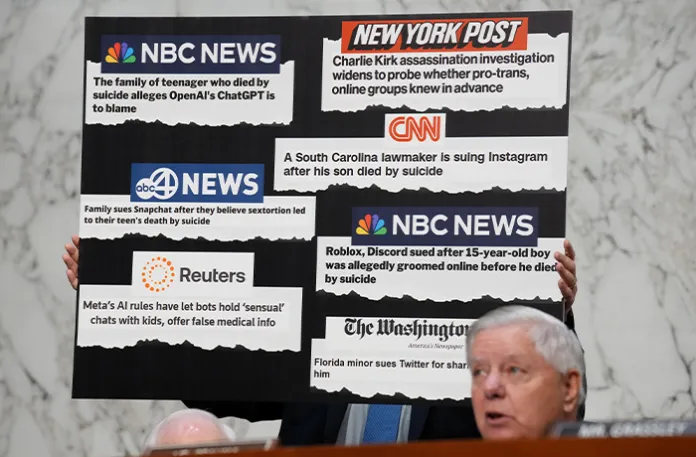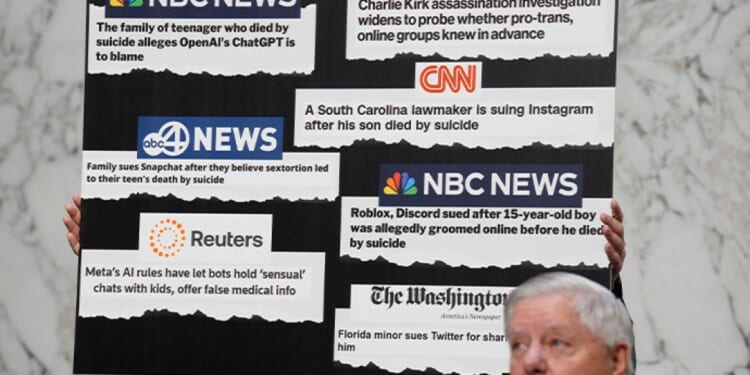The murder of conservative activist Charlie Kirk sparked renewed criticism of social media’s influence on the nation’s political climate and drew the ire of some officials for hosting content related to the killing.
Authorities arrested Tyler Robinson, 22, after the Sept. 10 assassination of the Turning Point USA founder at Utah Valley University in Orem, Utah. Utah County prosecutors charged Robinson with seven crimes, including aggravated murder, and are seeking the death penalty.
Text messages between Robinson and his romantically involved roommate, a male transitioning to female, show Robinson referring to a paper note he left confessing to the crime, then confessing over text to the murder, and when asked why he did it, stating that, “I had enough of his hatred. Some hate can’t be negotiated out.”
Authorities indicated that Robinson was active on the social media site Discord, a platform used primarily, but not exclusively, for online gamers. Journalist Ken Klippenstein published the Discord messages on Substack. Robinson’s exchanges show that, beyond his confession, including that he was about to turn himself in to authorities, and an apology for “all of this,” his chats do not seem political or contain anything directly related to the crime.

The Washington Examiner has not independently verified those messages.
Despite scant evidence tying social media to the actions or radicalization of Kirk’s accused killer, the popular medium was decried by many in the wake of the shooting for contributing to a climate of political intolerance.
Gov. Spencer Cox (R-UT) told NBC News’s Meet the Press that he thinks “social media has played a direct role in every single assassination and assassination attempt that we have seen over the last five, six years. There is no question in my mind.” He added that comparing social media to cancer “probably isn’t a strong enough word.”
Criticism for social media came less from the suspect’s seemingly unrelated use of it, but instead centered on social media hosting much of the public’s conversation in reaction to Kirk’s killing.
Most of the biggest U.S.-based online platforms acted within hours of the incident to label, remove, blur, or age-restrict the posted footage of Kirk being killed. But in the meantime, the video spread rapidly and widely online, sparking debate about its viewing being gratuitous and in need of being taken down or newsworthy and justified in remaining available for viewing. Those types of difficult decisions are common in online content moderation decisions when violent or otherwise sensitive materials are in question.
Days later, the social media debate moved to scrutiny around users’ posts after Attorney General Pam Bondi said she would “absolutely target” those engaging in “hate speech.” Critics from both sides of the political aisle took to social media to condemn her comments. Many of them posted a May 2024 X post by Kirk himself that reads, “Hate speech does not exist legally in America. There’s ugly speech. There’s gross speech. There’s evil speech. And ALL of it is protected by the First Amendment. Keep America free.” Bondi walked back her comments the next day, clarifying on X that, “Hate speech that crosses the line into threats of violence is NOT protected by the First Amendment. It’s a crime.”
Across the country, numerous people have lost or been suspended from their jobs in reaction to comments they made about Kirk and his death online. Those people range from well-known national figures to low-profile citizens employed in both the public and private sectors.
A website titled “Charlie Kirk Data Foundation” offered a searchable list of people alleged to have posted critical comments about Kirk and went viral before being taken down. The anonymous operators of the site claimed more than 63,000 Kirk detractors were listed.
POLITICAL VIOLENCE ON THE RISE IN THE US: A TIMELINE OF KEY INCIDENTS
After initial concerns centered on social media’s role, attention by the administration of President Donald Trump has turned to broadcast media. Federal Communications Commission Chairman Brendan Carr made public comments indicating that the agency would take action addressing late-night talk show host Jimmy Kimmel’s on-air remarks about the politics of Kirk’s accused killer if broadcasters did not do so themselves. Hours later, ABC pulled the show from the airwaves. Free speech advocates decried the move as unconstitutional “jawboning” and censorship. Carr defended himself by saying he was making clear his intention to enforce the FCC’s “public interest obligation.”
It remains to be seen if the administration’s efforts to influence the conversation around Kirk’s death and legacy have more success in regulated media, such as broadcast television, than their sometimes flailing efforts to steer opinion on social media.
Jessica Melugin is the director of the Center for Technology and Innovation at the Competitive Enterprise Institute and a 2025 Innovators Network Foundation antitrust and competition policy fellow.

















